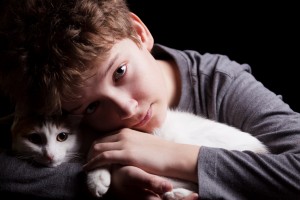
Understanding the many facets of a child’s emotions
By Mary Jane Sterne and Peggy Edwards
As educators in psychology and health promotion, we have read and written a lot about adult stress. But it was only recently that Peggy began to think about stress from a child’s point of view when she came across a marvelous resource called Kids Have Stress Too!
As a grandmother who has the good fortune to be close to numerous grandchildren, I have heard many (sometimes tearful) stories about what upsets and troubles kids. And like most grandparents, I have seen young grandchildren melt down or act out when they are overtired, frustrated or frightened. But now I wonder, do kids understand and experience stress like adults do? Are their stressors the same? Should we focus more (or less) on kid’s stress? And most impor- tantly, how can we, as loving grandparents, help our grandchildren avoid and deal with distress?
Hans Selye, the Canadian pioneer for early research on stress, says stress is our body’s reaction to feeling afraid, over- or under-stimulated, threatened or excited.A certain amount of stress is good. It actually helps us feel energized and interested in life. However, when we are faced with too many stressors, it can interfere with our ability to respond to everyday tasks and challenges. Over time, this can lead to physical, mental and emotional health problems.
I did a little informal research to help identify the major stressors in kid’s lives. No surprise, they were very similar to stressors in adult lives (substitute work/retirement for school in the list below).
Really? The grandkids have stress? Yes!
When I asked the grandkids and their friends, aged six to 11, what causes them stress, here is what they said:
I feel stressed when:
- People get mad at me and yell at me, like my teacher or my parents.
- I did something wrong and my parents might take away something I really like as punishment.
- Other kids make fun of me or bully me.
- I worry because my grandmother is sick.
- I have too much homework and too many things I have to do.
- I have a hard test coming up at school.
- I have to read out loud at school or I have trouble with my school work.
- My parents argue.
- My sister picks on me or fights with my mom.
-
- I get nightmares and I can’t sleep.
- I come home and feel lonely; there is no one to talk to.
• People ignore me and don’t listen to me.
• I have to go to a new school.
In just a few minutes, these children identified the same stressors as most experts in child development do: changes in routines and settings, having too much (or too little) to do, a lack of sleep, a lack of control, illness in the family, and conflict and arguing at home, at school or with friends. These kinds of everyday stressors can turn into long-term or chronic stress in the event of serious ongoing conflict between family members, divorce or separation, death of a loved one, a serious illness or health condition, frequent moves, being bullied over time, and continually dealing with unrealistic expectations and demands (one’s own or from others). When these things happen, children may feel stressed for a long time. But most of all, it is stressful when kids feel lonely and unloved.Too many stressors makes it difficult for kids to get along with others; interferes with their ability to learn; and can have a negative effect on their emotional, mental and physical health. Children may act out and be reprimanded for actions that are really stress reactions, rather than intentional misbehaviour or poor cognitive ability.
So how can parents, grandparents, caregivers and teachers help?
In four essential ways:
First, provide nurturing, stable environments that build emotional health, resilience and a sense of security. Children need exercise, healthy food, playtime, and unstructured downtime with no pressures. Calm morning and bedtime routines start the day off well and help children relax at the end of the day. Sleep is important – a tired child gets stressed more easily. Refrain from conflict, yelling and arguing in the household as much as possible.
Instead, try to talk through disagreements and demonstrate how you have learned to deal with stressful situations. Make a secure connection. Spend quality time together and ask kids how they feel. Be there. Make sure they know you will listen and not tell others about their fears and concerns. Have fun together. A good laugh helps fight off stress. Hug. Physical contact is one of the best stress relievers there is. In fact, research has shown being touched and hugged in early childhood evokes positive brain stimulation, which helps build brain pathways that help people cope with stress. We are never too old to benefit from giving and receiving hugs, kisses and physical comfort.
Help children learn to deal with stress. You can help young children reduce feelings of stress by getting them involved in activities they enjoy, such as cuddling a favourite stuffy, playing in the bathtub, reading a book, singing a song with you or stomping on a rug. Children of all ages (including you) can learn to use relaxation techniques, such as deep breathing . Blowing bubbles, which encourages deep breathing, is used in hospitals to help children cope with stressful illnesses and treatments. Older children can employ a number of strategies to help deal with stress, including, the use of physical activity and creative pursuits to let off steam and master skills.
They can also learn to self-regulate and make and keep friends; talk about their feelings and reframe everyday stresses as challenges that can be successfully addressed. You can model all of these strategies and facilitate their learning by talking things through with them. But remember, listening without interruption is the most important part of this conversation.
Peggy Edwards and Mary Jane Sterne are the authors of Intentional Grandparenting:A Boomer’s Guide (McClelland and Stewart, 2005). Peggy and Mary Jane live in Ottawa and have 23 grandchildren and five great-grandchildren between them.






